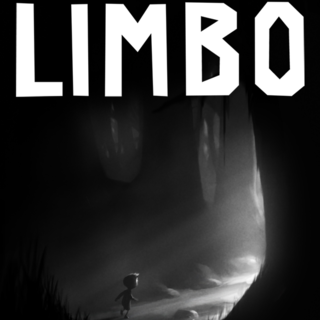Anybody have a flashlight?
In Limbo, you play the role of a mysterious boy with glowing white eyes. There is no colour: everything is presented in black and white with subtle and suggestive shades of grey (much more than 50; definitely not related to the book series). No explanation is ever given as to where the boy came from or what he needs to do. There is no spoken dialog, notes, letters, or signage to give you more information on his situation.
Limbo seems to be set in and around a nearly abandoned saw-mill town, some sort of Dawson City without the gold, at midnight.
The game starts up with the boy waking up in a forested, but swampy, back woods part of the area. The game controls are relatively simple: interact (usually push or pull), jump, and climb. Your control skills do not advance and you cannot swim. However, as the game progresses, you are presented with situations where you must figure out how to use them in novel ways to come up with creative solutions for overcoming obstacles.
Now, I did say nearly abandoned. You do encounter some silhouetted feral children, who set traps and are intent on preventing you from going any further (possibly from discovering who they are and where they live). You also cross paths with mutated creatures that try to contribute to your untimely demise.
The game grows even more surreal as it goes on. You encounter sophisticated (powered) setups and mechanisms with switches and levers and go through areas that seem to be able to alter and defy some basic, but very important, laws of physics.
Everything in Limbo is incredibly atmospheric. The subtle hidden and distorted sounds and visuals hint that opportunity and danger are always nearby. The way that things move, fall, and flow in the game feel very organic.
The only real knocks that I have against the game are things that, to a certain extent, add to its strength and keep it enjoyable.
First, there is no narrative. Players must use their imagination to fill in the gaps for the back story of the boy and environment that he has to navigate through. Limbo doesn't overwhelm you with details, but it doesn't give you any teasing ones either.
Second, the game ends abruptly. This makes for seemingly a short game, especially if you get sucked in and end up playing through it in one sitting, but one that stays fun right to the end.
Third, and lastly, when the game ends, it does not tell you what it was all about. The game keeps you guessing as you play. That's fine, but the best games always give up "the goods": the checklist of what you have accomplished for all of your efforts (saved the world, made a few bucks, etc.), at the end.
Still, Limbo is a great game. It doesn't let you go Conan, the Barbarian or O'Brien, on the world, but it might make you appreciate how much more complex things can be in a world that you think you've seen.

